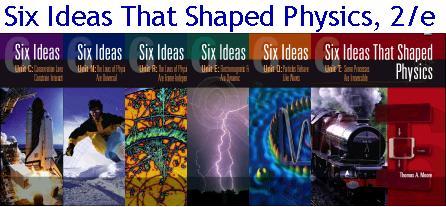
Instructor: |
B. Martin (office A207) |
Schedule: |
Monday, Wednesday, Friday 10:00 - 10:50 am (lecture: S210); Labs Friday 2:00 - 5:00 (lab/studio: S210) |
Prerequisites: |
Physics 30 and Math 30 or equivalent |
Calendar Description:
Conservation of energy and momentum, vectors, introduction to rotational kinematics and dynamics,Newton's laws of motion, forces in equilibrium, dynamics, introduction to gravitation.
Required Text:
| Thomas A. Moore, Six Ideas That Shaped Physics 3rd edition. McGraw-Hill 2003. Units C and N |  |
All of creation testifies to God and so it should be no surprise that Physics, by exploring the physical world, also explores God's relationship with creation and us. In this course, we will take time to look at how the laws of the natural world are a reflection of the relationship between Creator and Creation. Clearly our task is to develop skills and understandings but we should also be able to look "beyond" these and see how and where ideas come from.
Read this carefully! There will be two kinds of assignment - each with its own purpose:
| initial attempt | Your
initial solutions will be graded on a 0 - 5 point scale: |
|
| 0
= |
no effort | |
| 1
= |
poor effort, major errors | |
| 2
= |
fair effort with modest conceptual errors or good effort with major conceptual errors | |
| 3
= |
good effort with minor conceptual errors or fair effort with only minor errors | |
| 4
= |
good effort with only minor errors | |
| 5
= |
good effort with no errors | |
| correction | You will receive your initial attempts the following class with a minimum of comments and a numerical score. The solutions to these questions will be posted at this time! You may receive up to 2 additional points if you correctly identify your mistake and correct it in a different color. You must clearly identify the error (explain what you did wrong not merely rephrase the posted solution!). You have up to (but not exceeding) one week to hand in your corrections. | |
| Unit C | October 20, 2017; 2:00 pm - S210 |
| Unit N | November 24, 2017; 2:00 pm - S210 |
A final exam, based on the entire course (units C and N) will be scheduled for December.
Your final grade in the course will be comprised of both lecture and lab marks. The weighting is as follows:
| Unit exams (2) |
30% |
| assignments |
25% |
| final exam (1) |
20% |
| lab reports/exercises |
25% |
Your final grade will be expressed using the alpha grade system used by The King's University College. See student calendar for more information
Note: you must pass the lab section of the course in order to pass the course.
In addition to the topics discussed above, the historical and cultural dimension of the ideas of physics will, where appropriate, be explored. This will lead to discussions relating one's worldview to one's physics (i.e. relating the Newtonian world view to modern determinism).
Physics 241 Laboratory Outline
Physics 241 consists of both lecture and laboratory activities. Laboratories will be based upon context-rich, collaborative learning situations. Lab activities will consist of:
Collaborative Groups
Recent educational research shows that students, working in collaborative groups, achieve significant benefit in both skill development and understanding. Throughout the term you will be assigned to a working group of three or four students (these will change during the term). All lab submissions are to be done as a group project. In some cases groups will be responsible for the design and implementation of experiments. All student initiated labs must be approved by both the instructor and the special projects coordinator - Ms. C. Slupsky.
Rich Context Problem Solving
A component of the lab activities and some assignment problems will be the introduction of rich context problems. These are complex problems that more closely mirror "real-life" situations and will require group effort to solve. In some cases the problems will be designed to motivate a specific laboratory investigation.
Laboratory Objectives
There are a number of key objectives for this section of the course:
Written Lab Work
Your participation (and eventual grade received) will be made up of a series of items: